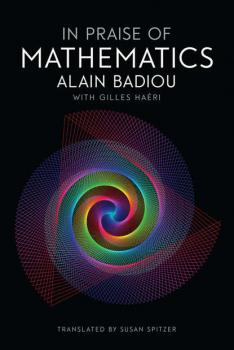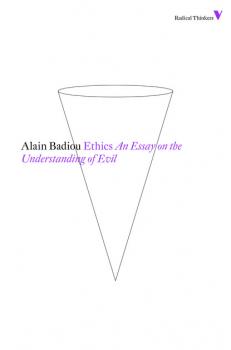ТОП просматриваемых книг сайта:
Alain Badiou
Список книг автора Alain BadiouАннотация
The question of migration has come to dominate the news agenda in many countries, but what does the word ‘migrant’ really mean today and how should we respond to those who are labelled ‘migrants’?<br /> <br /> In this short book Alain Badiou argues that our way of thinking about migration should be governed both by an ethical duty to welcome the migrant in the name of hospitality and also by the urgent need to put an end to the global capitalist oligarchy that has produced the migrant as a figure of contemporary crisis. For the ‘migrant,’ argues Badiou, is in fact a nomadic proletarian. Today, our homeland is the world, and any meaningful politics must include those who come to us and who represent the universal nomadic proletariat. <br /> <br /> Writing with the rigor, clarity, and polemical flair that have made him one of the world’s most influential philosophers, and drawing on a rich body of material including contemporary poetry and the words of an anonymous migrant, Badiou develops a powerful riposte to those who have stoked the fear of migrants and exploited the migration question for political ends.
Аннотация
Why bother to praise mathematics when you claim, as Alain Badiou does, that philosophy is first and foremost a metaphysics of happiness, or else it’s not worth an hour of trouble? What possible relationship can there be between mathematics and happiness? That is precisely the issue at stake in this dialogue, which serves as a very accessible introduction to what mathematics is and an exploration of the crucial influence it has always exerted on the greatest philosophers. Far from the thankless, pointless exercises they are often thought to be, mathematics and logic are indispensable guides to ridding ourselves of dominant opinions and making possible an access to truths, or to a human experience of the utmost value. That is why mathematics may well be the shortest path to the true life, which, when it exists, is characterized by an incomparable happiness.
Аннотация
'I'm 79 years old. So why on earth should I concern myself with speaking about youth?' This is the question with which renowned French philosopher Alain Badiou begins his passionate plea to the young. Today young people, at least in the West, are on the brink of a new world. With the decline of old traditions, they now face more choices than ever before. Yet powerful forces are pushing them in dangerous directions, into the vortex of consumerism or into reactive forms of traditionalism. This is a time when young people must be particularly attentive to the signs of the new and have the courage to venture forth and find out what they're capable of, without being constrained by the old prejudices and hierarchical ideas of the past. And if the aim of philosophy is to corrupt youth, as Socrates was accused of doing, this can mean only one thing: to help young people see that they don't have to go down the paths already mapped out for them, that they are not just condemned to obey social customs, that they can create something new and propose a different direction as regards the true life.
Аннотация
One of the world’s leading radical philosophers analyses the failure of the Syriza experience in Greece In a series of seven trenchant interventions Alain Badiou analyses the decisive developments in Greece since 2011. Badiou considers this Mediterranean country “a sort of open-air political lesson”, with much to tell us about the wider situation. Greece is exemplary of “our fundamental contradictions in Europe, which are also ultimately the fundamental contradictions of the world such as it is—the world served up to the authoritarian anarchy of capitalism.” Notwithstanding the Greeks’ heartening opposition to the financial markets’ hegemony, Badiou considers it also important to address the reasons why this opposition failed. “Movementist” politics may arouse widespread sympathy, but for the French philosopher they have “absolutely no effect other than to temporarily trap the movement in the negative weakness of its affects.” Badiou argues that a consequential opposition inspired by the emancipatory politics of the past—or by what he calls “the communist hypothesis”—should set its compass by the “orienting maxims” proposed in this book, defining a direction for political action.
Аннотация
A new program for the Left after the death of neoliberalism. ‘We know that communism is the right hypothesis. All those who abandon this hypothesis immediately resign themselves to the market economy, to parliamentary democracy—the form of state suited to capitalism—and to the inevitable and “natural” character of the most monstrous inequalities.’—Alain Badiou Alain Badiou’s ‘communist hypothesis’, first stated in 2008, cut through the cant and compromises of the past twenty years to reconceptualize the Left. The hypothesis is a fresh demand for universal emancipation and a galvanizing call to arms. Anyone concerned with the future of the planet needs to reckon with the ideas outlined within this book.
Аннотация
One of the most powerful voices in contemporary French philosophy explodes the facile assumptions behind the recent ethical turn. Ethical questions dominate current political and academic agendas. While government think-tanks ponder the dilemmas of bio-ethics, medical ethics and professional ethics, respect for human rights and reverence for the Other have become matters of broad consensus. Alain Badiou, one of the most powerful voices in contemporary French philosophy, explodes the facile assumptions behind this recent ethical turn. He shows how our prevailing ethical principles serve ultimately to reinforce an ideology of the status quo, and fail to provide a framework for an effective understanding of the concept of evil. In contrast, Badiou summons up an “ethic of truths” which is designed both to sustain and inspire a disciplined, subjective adherence to a militant cause (be it political or scientific, artistic or romantic), and to discern a finely demarcated zone of application for the concept of evil. He defends an effectively super-human integrity over the respect for merely human rights, asserts a partisan universality over the negotiation of merely particular interests, and appeals to an “immortal” value beyond the protection of mortal privileges.
Аннотация
Dissecting how facile accusations of “anti-Semitism” are used to stifle dissent. Since the inception of the “War on Terror”, Israel has become increasingly important to Western imperial strategy and ever more aggressive in its policies towards the Palestinians. A key ideological weapon in this development is the cynical and unjustified accusation of ‘anti-Semitism’ to silence protest and dissent.For historical reasons, this tactic has been deployed most forcefully in France, and in the first of the two essays in this book French writers Alain Badiou and Eric Hazan demolish the ‘anti-Semitism is everywhere’ claim used to bludgeon critics of the Israeli state and those who stand in solidarity with the ‘banlieue’ youth. In “The Philo-Semitic Reaction”, Ivan Segré undertakes a meticulous deconstruction of a rampant reactionary trend that identifies Jewish interests with the ‘democratic’ West. Segré’s aim is to uphold a universalist position and to defend Jewish tradition from Zionist ideological distortion.
Аннотация
Testing the winds of history blowing from the Arab revolts. In the uprisings of the Arab world, Alain Badiou discerns echoes of the European revolutions of 1848. In both cases, the object was to overthrow despotic regimes maintained by the great powers—regimes designed to impose the will of financial oligarchies. Both events occurred after what was commonly thought to be the end of a revolutionary epoch: in 1815, the final defeat of Napoleon; and in 1989, the fall of the Soviet Union. But the revolutions of 1848 proclaimed for a century and a half the return of revolutionary thought and action. Likewise, the uprisings underway today herald a worldwide resurgence in the liberating force of the masses—despite the attempts of the ‘international community’ to neutralize its power. Badiou’s book salutes this reawakening of history, weaving examples from the Arab Spring and elsewhere into a global analysis of the return of emancipatory universalism.
Аннотация
A journey through twentieth-century philosophy with the titan of French thought. Pocket Pantheon is an invitation to engage with the greats of postwar Western thought, such as Lacan, Sartre and Foucault, in the company of one of today's leading political and philosophical minds. Alain Badiou draws on his encounters with this pantheon – his teachers, opponents and allies – to offer unique insights into both the authors and their work. These studies form an accessible, authoritative distillation of continental theory and a capsule history of a period in Western thought.










